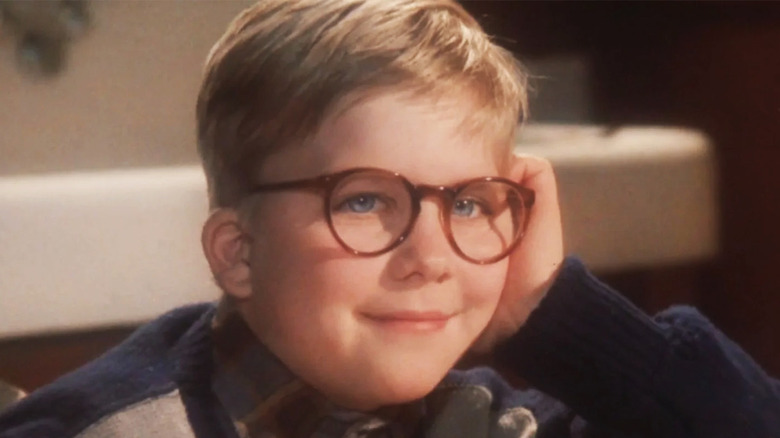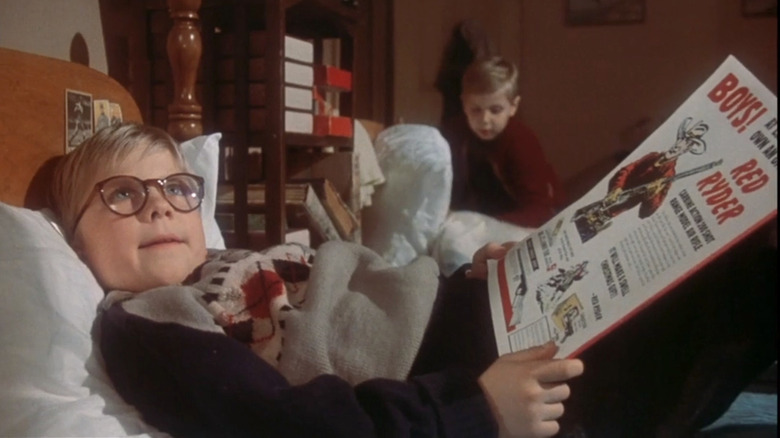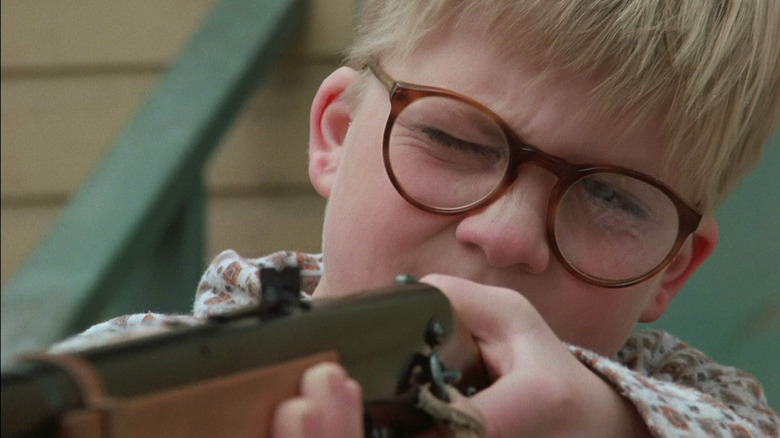Screenwriting Guru Robert McKee Believed A Christmas Story Created A New Genre Of Film
There is an irony at play with Bob Clark's 1983 film "A Christmas Story." Set in 1940, "A Christmas Story" told an aggressively unromantic story of what childhood looked like at the time. It was a movie meant to undo any notions of warm nostalgia, freeing Christmastime from its halcyon and clichéd Rockwellian idylls. The young Ralphie (Peter Billingsley) was no well-behaved moppet, but a foul-mouthed, bratty child who longed to fire a weapon. He hated his school, and vengefully beat up schoolyard bullies. Santa was scary. The family Christmas tree was ruined. Christmas dinner had to be eaten at a Chinese restaurant, one of the only places open on December 25. Tradition, "A Christmas Story" posits, is an embarrassing joke.
The irony comes in with the film's eventual reputation. "A Christmas Story" became a seasonal classic, and the Gen-X children who grew up watching it happily proselytized its comedic power. Eventually, certain cable TV stations began running 24-hour marathons of "A Christmas Story," played over and over again every year. It was adapted into a musical. The film became the very nostalgia it sought to eschew. "A Christmas Story" remains very much in the popular consciousness, and a sequel, "A Christmas Story Christmas," was released on HBO Max on November 17 of this year.
Billingsley, now 51, has recently launched a podcast with screenwriter Nick Schenk called "A Cinematic Christmas Journey," produced by Vince Vaughn ("Fred Claus," "Four Christmases"). On it, the two hosts kibbitz about holiday movies in general, and have regular guests who have been involved in them. On the debut December 8 episode, they discussed screenwriting guru Robert McKee's conclusion that "A Christmas Story" resonated so widely because it essentially created a new genre.
Robert McKee
Robert McKee, for those unfamiliar with the name, is a screenwriting expert who has made a name for himself holding summits on storytelling and the art of screenwriting. Many film students are familiar with his work, and he was famously included as a character in Spike Jonze's 2001 film "Adaptation," wherein he was played by Brian Cox. One can find clips of his STORY seminars online and still see him speak to this day.
Schenk and Billingsley noted that McKee was very fond of "A Christmas Story" and its seemingly novel use of narration. "A Christmas Story" is narrated from the present day by an adult Ralphie remembering his childhood. On the podcast, Billingsley revealed that he had attended one of McKee's seminars, an intense three-day lecture course devoted entirely to story structure. Billingsley related his experience, saying:
"So I'm sitting there, and he's going on and on about story and structure, and then he starts talking about genres. And he's like 'There's three known genres: Comedy, Drama, Tragedy, right? I don't care what they say, you can put every movie into these genres.' He said, 'However, there is a fourth genre.' Everyone sort of perks up, and says, 'Okay, this is interesting.' And he says, 'It came in the form of a movie. And this movie has a unique form of voiceover.'"
Billingsley didn't know that it was going to be his own movie that McKee was about to mention.
The fourth genre
Billingsley continued, describing what McKee felt was a fourth genre:
"'[The film is] objective, meaning you can look back and be reflective, but it's also subjective, where they're in the moment, in the scene with the movie.' And I thought 'Okay, well what movie is this?' And he said 'And the movie's called "A Christmas Story."' And I just kind of laid down."
No, it seems that McKee was not aware that the star of "A Christmas Story" was in the lecture hall with him. Billingsley was only there as a curious student who had paid his entrance fee like everyone else. McKee's comment immediately had Billingsley thinking of a classroom scene in "A Christmas Story," where the childhood Ralphie on screen and the adult Ralphie narrating were having two separate emotional experiences simultaneously.
In terms of genre, "A Christmas Story" plays like a mash-up of comedy and wistful tragedy. Ralphie's childlike pettiness and greed are certainly relatable, but the adult narrator gives every moment an objective quality. We can relate to Ralphie, but also pity him, love him, and hate him. It's a combination of a sitcom and memoir. It's clearly a fabricated melodrama, but it has the ultimate impact of realism. The blend of embarrassment, whimsy, and self-recognition may be the key to unlocking the film's lasting appeal. "A Christmas Story" may function as an antidote to Christmastime sentimentality, but it also feels good, sometimes, to take our medicine.


